

Aluminium in brain tissue in autism. Drug reverses autism brain activity in mice, study shows. A generic blood pressure drug could prevent hyperactive brain cell firing associated with early stages of autism spectrum disorder, according to a new study.

Injecting pregnant mice with Bumetanide, a diuretic, appears to correct a developmental switch flipped during childbirth that reverses the firing characteristics of neurons in newborns, according to a study published online Thursday in the journal Science. Bumetanide mimics the effects of oxytocin, a hormone released during labor that helps protect newborns from the stresses and complications of birth, the study found. That surge of oxytocin changes the way a neurotransmitter regulates neurons -- it no longer encourages the firing of neurons and becomes a kind of electrochemical brake in the adult brains. Overly excited brain circuits are strongly linked with autism spectrum disorder, a disease that strikes an estimated 1 of every 88 children, causing them to have restricted interests, and impaired communication and social skills. ‘Love hormone’ improves attachment issues in people with autism – News.
Oxytocin, often dubbed the ‘love hormone’, is known to promote social bonding.
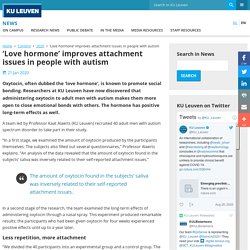
Researchers at KU Leuven have now discovered that administering oxytocin to adult men with autism makes them more open to close emotional bonds with others. The hormone has positive long-term effects as well. A team led by Professor Kaat Alaerts (KU Leuven) recruited 40 adult men with autism spectrum disorder to take part in their study. “In a first stage, we examined the amount of oxytocin produced by the participants themselves. The subjects also filled out several questionnaires,” Professor Alaerts explains. The amount of oxytocin found in the subjects’ saliva was inversely related to their self-reported attachment issues. In a second stage of the research, the team examined the long-term effects of administering oxytocin through a nasal spray.
Less repetition, more attachment “We divided the 40 participants into an experimental group and a control group. Further research necessary. First Long-term Data for 'Love Hormone' in Adult Autism - January 29, 2020. Study shows which children with autism respond best to oxytocin treatment. Autism is a developmental disorder characterized by poor social ability and verbal communication skills, as well as restrictive and repetitive behaviors.
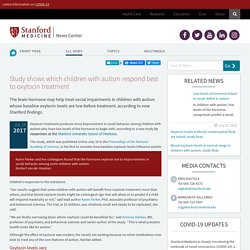
Behavioral effects of multiple-dose oxytocin treatment in autism: a randomized, placebo-controlled trial with long-term follow-up. No significant baseline differences were revealed between participants allocated to the OT or PL group for any of the questionnaires (see Additional file 1: Table S3) or in terms of participant characteristics (see Table 1).
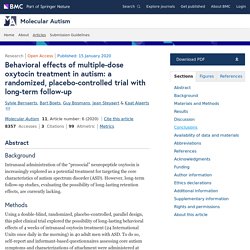
Primary outcome—Social Responsiveness Scale Self-rated SRS-A. Oxytocin spray boosts social skills in children with autism. Sniff test: Children with the lowest blood levels of oxytocin benefit most from a nasal spray of the hormone.
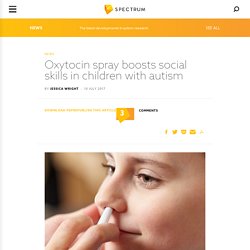
Catalin Petolea / shutterstock Treatment with the hormone oxytocin improves social skills in some children with autism, suggest results from a small clinical trial. The results appeared today in the Proceedings of the National Academy of Sciences1. Oxytocin, dubbed the ‘love hormone,’ enhances social behavior in animals. This effect makes it attractive as a potential autism treatment. Young children with autism may benefit from oxytocin treatment. SYDNEY, Oct. 27 (UPI) -- Young children with autism in a small study who were treated with the synthetic hormone oxytocin showed improvement in social, emotional and behavioral issues.

It is thought to be the first effective drug treatment for social impairments associated with autism. Behavioral therapy has been shown to help children with autism, however it can be time-consuming and costly. "The potential to use such simple treatments to enhance the longer-term benefits of other behavioural, educational and technology-based therapies is very exciting," said Adam Guastella, an autism researcher at the University of Sydney, in a press release.
'Love hormone' oxytocin improves attachment issues in people with autism. Summary: Male patients on the autism spectrum who were given oxytocin for four weeks experienced improvements in social attachment behaviors for up to 12 months.
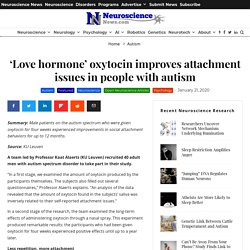
Source: KU Leuven A team led by Professor Kaat Alaerts (KU Leuven) recruited 40 adult men with autism spectrum disorder to take part in their study. “In a first stage, we examined the amount of oxytocin produced by the participants themselves. The subjects also filled out several questionnaires,” Professor Alaerts explains. Oxytocin administered to the nose increases emotion perception in autism. A recent study has demonstrated that intranasal oxytocin can influence how individuals with autism perceive emotion in others.
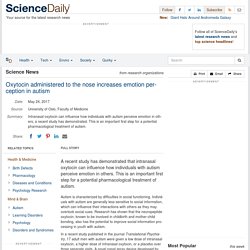
This is an important first step for a potential pharmacological treatment of autism. Autism is characterized by difficulties in social functioning. Individuals with autism are generally less sensitive to social information, which can influence their interactions with others as they may overlook social cues. Research has shown that the neuropeptide oxytocin, known to be involved in childbirth and mother-child bonding, also has the potential to improve social information processing in youth with autism.
In a recent study published in the journal Translational Psychiatry, 17 adult men with autism were given a low dose of intranasal oxytocin, a higher dose of intranasal oxytocin, or a placebo over three separate visits. Oxytocin may enhance social awareness in autism. April 18, 2018 5 min read Receive an email when new articles are posted on Please provide your email address to receive an email when new articles are posted on .
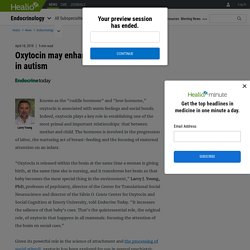
Oxytocin Nasal Spray May Boost Social Skills in Children with Autism. Treatment with the hormone oxytocin improves social skills in some children with autism, suggest results from a small clinical trial.
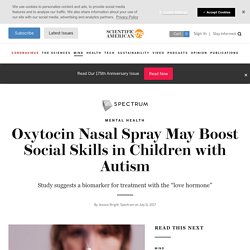
The results appeared today in the Proceedings of the National Academy of Sciences1. Oxytocin and L. reuteri: Turning the clock back 10 or 20 years. I’ve been talking an awful lot about our Lactobacillus reuteri yogurt lately. If you are just joining the discussion, see this last post for a summary, brief rationale, and how we make our yogurt using a method to boost bacterial counts (CFUs). I’ve been talking about it because it is one of the most exciting ideas to have come along in a while that you can put to work with visible and perceptible results within days to weeks. It even provides additional benefits over and above the extravagant health and age-reversing benefits obtained through the Undoctored Wild, Naked, Unwashed program and the Wheat Belly efforts. Every week on our Undoctored Inner Circle Virtual Meetups, another person reports a new change in skin health, for instance: reduced neck wrinkles, elimination of purpura (a form of bruising), thicker skin, veins no longer visible, smoother texture.
Oxytocin – The Neurochemical of Everything Good - Oxytocin Central.com Oxytocin and Autism Spectrum Disorders - PubMed. Autism spectrum disorder (ASD) is a neurodevelopmental disorder whose core symptoms include deficits in social interaction and communication besides restricted and repetitive behaviors. Although ASD is highly prevalent, affecting 1/100 in the general population, no medication for the core symptoms has been established.
Therefore, the disorder is considered a huge unmet medical need and a heavy burden on individuals with ASD, their families, and entire society. Oxytocin is expected to be a potential therapeutic resource for the social core symptoms of ASD, since this neuropeptide can modulate human social behavior and cognition. This review article provides an overview of both experimental and clinical studies on effects of oxytocin administration on behavior, neural underpinnings, and symptomatology of ASD. Although the number of studies is increasing, several issues remain for further development of clinical application of the neuropeptide. The role of oxytocin in social bonding, stress regulation and mental health: An update on the moderating effects of context and interindividual differences.
Admon et al., 2013 R. Admon, G. Lubin, J.D. Intranasal Treatment of Central Nervous System Dysfunction in Humans. 1.van Sorge NM, Doran KS. Defense at the border: the blood-brain barrier versus bacterial foreigners. Future Microbiol. 2012;7(3):383–94.PubMed Article Google Scholar 2.Bitter C, Suter-Zimmermann K, Surber C. Nasal drug delivery in humans. Curr Probl Dermatol. 2011;40:20–35.PubMed Article CAS Google Scholar 3.Lindup WE, Orme MC. Buy Oxytocin Hormone in a Convenient Oxytocin Nasal Spray. Formed in 2009, the Archive Team (not to be confused with the archive.org Archive-It Team) is a rogue archivist collective dedicated to saving copies of rapidly dying or deleted websites for the sake of history and digital heritage. The group is 100% composed of volunteers and interested parties, and has expanded into a large amount of related projects for saving online and digital history.
History is littered with hundreds of conflicts over the future of a community, group, location or business that were "resolved" when one of the parties stepped ahead and destroyed what was there. With the original point of contention destroyed, the debates would fall to the wayside. Archive Team believes that by duplicated condemned data, the conversation and debate can continue, as well as the richness and insight gained by keeping the materials. The main site for Archive Team is at archiveteam.org and contains up to the date information on various projects, manifestos, plans and walkthroughs. Oxytocin biology and the social deficits of autism spectrum disorders. Oxytocin in the autism brain - Autism Brain Net. Zerbor / Shutterstock It is well known that individuals with autism spectrum disorder (ASD) have difficulties in social interactions.
However, the biological causes of these difficulties are not well understood. In the brain, many social and associated behaviors are modulated by the release of a chemical compound called oxytocin1. Mathematical Models for Possible Roles of Oxytocin and Oxytocin Receptors in Autism. Columbia University.